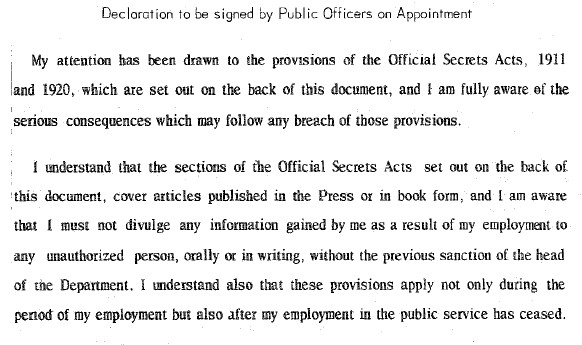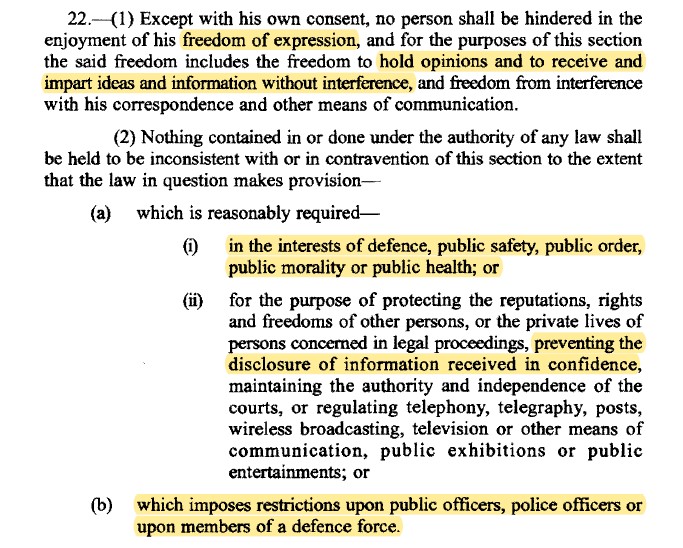Sharing my thoughts on the Official Secrets Act (OSA) & why I think it would be difficult to enforce against Public Sector Workers. These views are mine and mine alone. This is not legal advice.
1. Brief history: The 1911 OSA was enacted in England leading up to WWI for national security purposes, to stop spies & others sharing state secrets with enemies. Its purpose was never to protect the Crown from embarrassment.
2. When Ja. became independent in '62, all UK laws in force immediately prior were 'saved' and remained law in Jamaica. That's how OSA got on our books. We didn't pass it, we received it. That's why it's not on Ministry of Justice's website or published in the Laws of Jamaica.
3. OSA makes it an offence for a public servant with documents or information obtained because of their job to disclose them to anyone without authorisation, whether during or after their employment. You could be imprisoned for up to 2 years.
4. It does not, as some people think, have anything to do with doctor/ patient confidentiality or attorney/client privilege. That comes under other regulations that do not carry criminal sanctions or prison terms. OSA protects the government's information, not yours.
5. So, for e.g., the late Dwight Nelson was said to have tried to muzzle Rear Admiral Hardley Lewin with OSA when the former Commissioner of Police suggested that Dudus Coke was tipped off within 15 minutes of Nelson being informed of the extradition request.
6. Over the years, both political parties have made statements in support of the repeal of OSA. In 2011, Prime Minister Bruce Golding said that such legislation had no place in an independent country.
7. He said, "This has no place and if next year we’re going to be celebrating 50 years of independence, then I would like to say bye-bye to this before we celebrate that 50”
[Obviously, we did not say bye-bye to the law. We said it to Bruce.]
[Obviously, we did not say bye-bye to the law. We said it to Bruce.]
8. In 2009, a Joint Select Committee chaired by Daryl Vaz recommended that OSA be "repealed and replaced by an Act that would include penalties for the release of information that would put the State at risk." This would be in line with the 1989 amendment to OSA in the UK.
9. That Joint Select Committee was reviewing and reporting on the operation of the Access to Information Act and included Sandrea Falconer, Lisa Sweetah, Ronnie Thwaites, Dennis Meadows and several others. (Kudos to Sandrea for attending all 16 meetings, BTW! Vaz went to 6.)
10. The issue with OSA (besides it being colonial wartime legislation) is that it potentially conflicts with the right to freedom of expression and the right to "distribute or disseminate information, opinions and ideas through any media" contained in the 2011 Charter of Rights.
11. There's a case out of Singapore where a judge found that the same OSA violates their constitutional right to disseminate information BUT that the constitution had an exception for national security. Our constitution has no such qualification.
12. In fact, in the first draft of the Charter there was a carve out to freedom of expression where it concerned defence, public safety, public health etc. allowing restrictions on public officers. But this draft, shown below, was not passed.
13. That entire section was removed from the version that was passed. Does that mean that the 2011 Charter of Fundamental Rights and Freedoms repealed the 1911 Official Secrets Act? It would be poetic, wouldn't it? Exactly a century later. But no.
14. Inconsistent laws are not automatically repealed or ruled unconstitutional. Someone would need to take it to the Constitutional Court. It's important to note, though, that whilst our buggery and abortion laws are immune to a constitutional challenge, OSA is not.
15. I would be very surprised if any administration took steps to prosecute someone under OSA except in clear cases of state secrets being revealed that threaten national security or public safety. Outside of that, confidentiality can be preserved by contracts.
16. I think that OSA will be difficult to justify as being necessary in a free and democratic society when there are alternatives like confidentiality agreements that achieve the same purpose everyday.
17. At the same time, public servants who want to hold their employer accountable and speak out about wrongs they see also have options. We now have Whistleblower legislation and disclosures made via that law are protected.
18. Also, if you get a document via the Access to Information Act, (even if you had it before by virtue of your job) that's now outside the scope of OSA and you should be able to share it freely.
19. Finally, public sector workers - your opinions are yours, not the government's. You are free to comment and express yourself and to publicly disagree with your employer if you wish. You might get fired, but you won't end up in prison. (At least you shouldn't). The end.

 Read on Twitter
Read on Twitter



